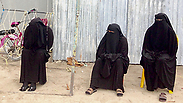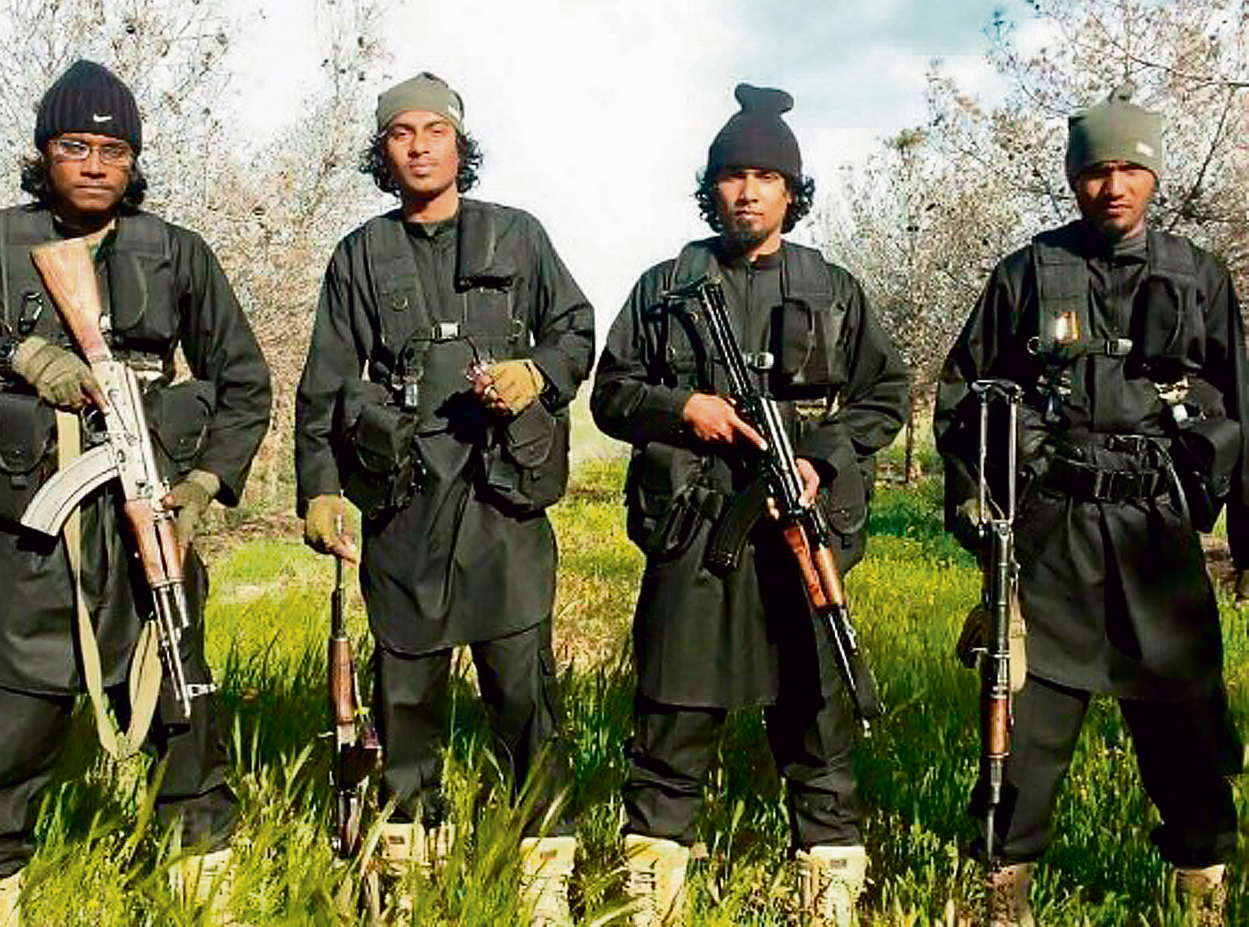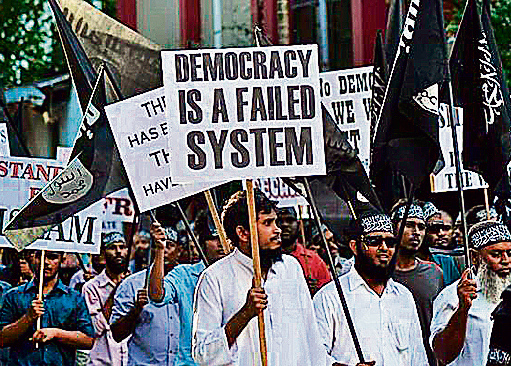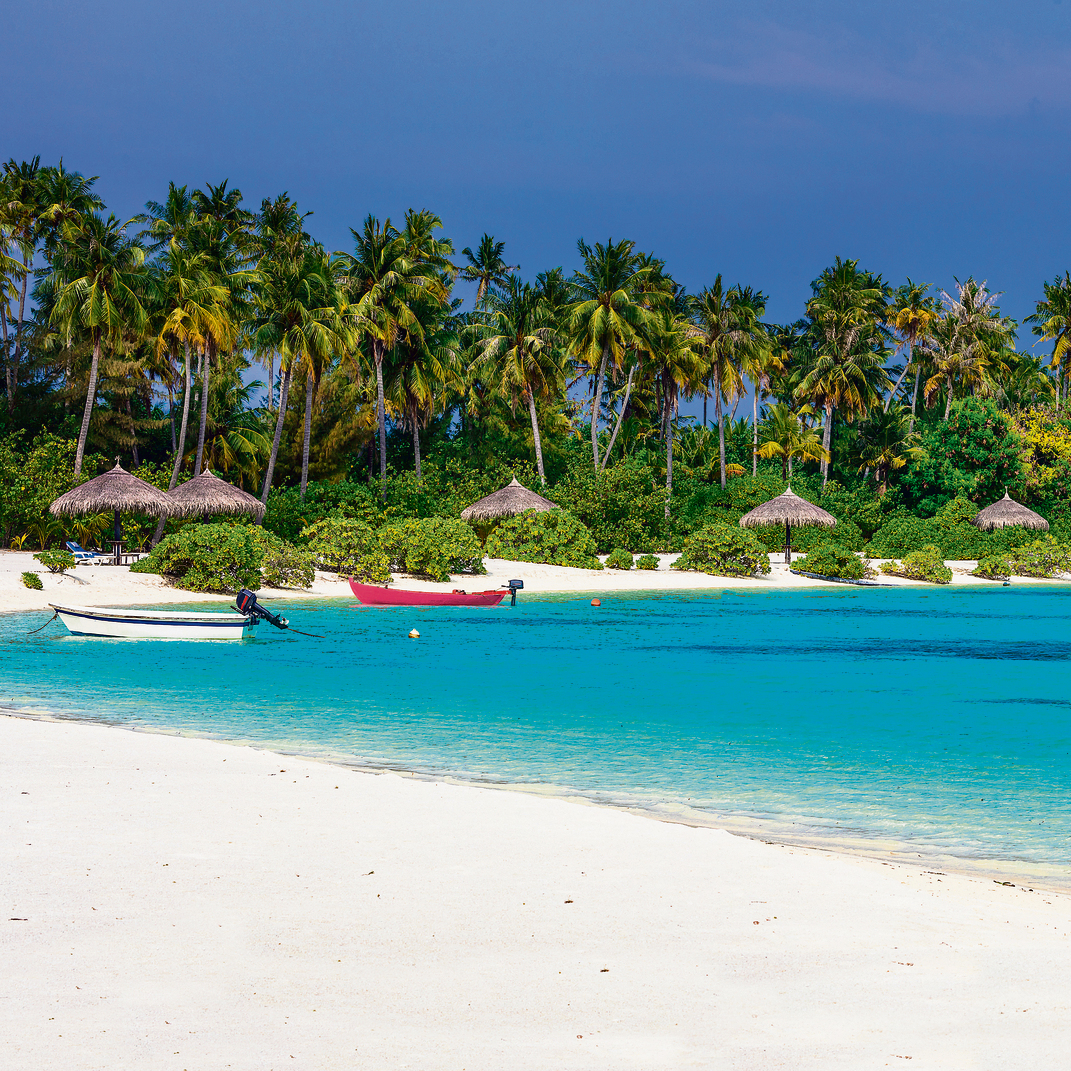

The Maldives: Paradise for jihadists?
Disillusioned by the rotten regime, high rates of crime and violence and the moral corruption of Islam in the country, many Maldivian youth decide to go to Syria to fight with ISIS, looking for brotherhood and a new life. And when they're done with Syria, they'll set their sights on Israel: 'It won't be easy, but we'll erase Israel off the map too.'
"They’re fighting really well, aren’t they?" says my taxi-driver with pride when I tell him I’ve flown in from the Middle East and that I’m a journalist. Speak with Muslims in Paris, Brussels or Tunis about ISIS jihadists and they reply mortified, almost apologetically, and tell you: They’re off their heads. But in the Maldives, they’ll give you a different answer: They are heroes.
Many Western tourists don’t even know that this is a Muslim country. But in fact, outside of the Arab world, the Maldives have the highest number of fighters among ISIS's ranks per capita: 200, more or less, out of 400,000 inhabitants. The government denies it. But each and every resident likely has a brother or cousin in Syria. While the rest of the world was watching the Olympics in August, everyone here was watching the battle of Aleppo. And rooting for al-Qaeda.
The Maldives are an archipelago of 1192 islands. But for the Maldivians, it is just one island: Malé. The islands only have a couple of shops, one school, and a tiny soccer pitch. Sometimes, residents don’t even have electricity. For all of their needs, they go to Malé. It covers 5.8 square kilometers, has 130,000 permanent residents, and a temporary population double that size. In Malé, every nook and cranny is inhabited.
Walking along one of the main avenues, the Buruzu Magu, I sneak into a gap, every bit a postcard view: a blue house, a green house and a yellow one. At the end of the alley there’s a spiral staircase. There are five living behind the first door to the right, nine behind the first on the left. The people behind the second door are all immigrants from Bangladesh; just one room with 18 living in it, sleeping in shifts.
In the next house, behind a door made out of a plank of rotten plywood, mother and daughter are chatting in the dark. Next to them, on some worn-out matting, there’s an old woman—also worn out—wheezing and groaning, her wispy grey hair looking like the filaments of a burnt-out lightbulb. There are 16 of them living here in a heap of rags and worn-out shoes, the walls patched up with jute and sheets of corrugated iron, and the stench of bodies hangs in the air.
The kitchen is a camping stove. There are no tables, chairs, nothing in the rooms—not even windows. Everything is just thrown together in a jumble, the washing hanging from the ceiling to dry. On the wall, there’s a plasma television acquired at the last election in return for a vote. The average monthly wage here is 8,000 rufiyaa (about $520), while the electrical bill reaches 7,000 rufiyaa ($450), the water bill is 4,000 rufiyaa ($260) and the rent for three rooms is 20,000 rufiyaa ($1,300).
Kinaan grew up in a house like this. With six to a room, their parents were arguing continually. The sea was their shower. He’s 31 now and he is the most notorious and feared criminal in Malé. Hang out with him and everybody will stand aside.
Malé is divided up between about thirty gangs, each one with 50 to 500 members. We are talking one tenth of the inhabitants, a fifth of all young people. In the first and most recent study on street violence, in 2009, 43 percent of those interviewed said that they didn’t feel safe even in their own houses.
Kinaan ended up in prison the first time at age 15 for getting into a fight. Ever since he was 17, he’s been a heroin-addict and an alcoholic. Even now, to make ends meet, he still sells drugs.
“Because here, no one gives you a second chance,” he says. “I’m prepared to do any kind of work, but nobody ever wanted to take me on. Not even as a dock worker. Sooner or later, we all get arrested, and all of us for drugs, because when you live ten to a room, the truth is you are living on the street. Malé is a hellhole, you have no future, nothing, and alcohol is forbidden. Heroin costs a lot less than a vodka. And the crazy thing is that sentences are really harsh. Steal a mango and you risk getting a year inside and being branded for life. But at the same time, there’s blanket tolerance because we’re in the service of politicians. And a price list, too: $1,200 for breaking a shop-window, $1,600 for mugging a journalist. You get hired for anything: from distributing leaflets to knifing someone. And if they want to, if you can be of use to them, they’ll get you out of prison.”
Kinaan was convicted twice, but has never served time. Like his friend Naaif. And so what do you do for a living? I ask Naaif. “I’m doing 25 years of prison,” he laughs.
When you look at Kinaan, dressed in an elegent suit, it's hard to believe he stabbed five people. But after the last time—when he had stabbed a young boy who died of his wounds—Kinaan decided to turn his life around. He has been trying to do so for ten years now. So he has taken things into his own hands and decided to give himself a second chance: he decided to go to Syria.
“It’s not difficult. Nobody stops you. They have every interest in getting rid of us. We have committed all their crimes for them, we know all their secrets. And we all want to leave. Anything is better than Malé. In Syria, if I’m killed, at least it’ll be for a good reason,” he explains.
Islam is justice
For many here, Syria is an economic, ideological and moral opportunity—a sort of deliverance from a country where the regime is rotten, the top five percent hold 95 percent of the country's wealth, crime and violence dominate the streets, and Islam, the ruling religion, has become morally corrupt. The poor youth dream of a pure, religious state—a new beginning.
Maumoon Aboul Gayoom had been president of the Maldives for thirty years—from 1978 to 2008—and is to this day still considered to be the father of the country. When Gayoom came to power, the Maldives were an archipelago of fishermen in the wild, far from the image of paradise. It was Gayoom, a graduate of al-Azhar university in Cairo, who had the idea of building resorts at $5,000 a night to draw in wealthy tourists.
It was a way of modernizing the country, but also of controlling it by concentrating the population in Malé and, above all, preventing any contact with other cultures.
Only 199 of the 1192 islands are inhabited, and 111 of them are resorts, but there’s no interaction between them. Not even within the resorts themselves. Once their shift ends, employees are forbidden from hanging around. And not a penny of the $3.5 billion in the Maldives' tourism revenues gets to the residents themselves. Moreover, the resorts have been built by foreign entrepreneurs. The law stipulates that they must be in partnership with a Maldivian; one who is obviously—in general—a friend of a politician. Or a politician himself.
In the Maldives, Islam has always been a political force, more than just a religion. Apart from reintroducing the death penalty, the new criminal code officialized the sharia a year ago for the first time. Moreover, political rivals are no mere opponents: they are infidels.
"They have politicized religion and sacralized politics," says Shahindha Ismail, head of the Democracy Network, the main human rights organization in the country.
Even the tsunami in 2004 was interpreted as God’s punishment. Many videos are shown in which the water washes away everything in its path on an island—except for the mosque.
The result is that today, many young guys are on their way to Syria.
Iyaas is a thin 22 year old, humble-looking, almost ascetic, a quiet and shy guy. He's wearing flip-flops, jeans and a mandarin-collar shirt that looks a bit like a galabiya. His beard is three or four centimeters long. And he's well prepared: he has saved up almost $3,000 for the journey—by selling hashish. He’s never been outside the Maldives, but his phone is filled with maps of Turkey, and he closely follows the battles on the front lines. He knows a lot less about Syria, though—its complexity, the clashes between rebels, the looting and smuggling—but this doesn't bother him, he would still tell you: “I am going to paradise.”
In any case, he knows even less about the Islamic country that he wants to live in. He mostly knowns what it shouldn't be. The problem, he says, is democracy: The idea that we live based on how we want to live, rather than on how God wants us to live.
What do you expect to find in Syria? I ask him. He has no doubt about that: “Brotherhood.” A new life. A different life. “A society in which we are all men and not vultures and carrion like here, where everyone takes advantage of each other.”
Muhammad Aiham laughs when I tell him that the Europeans think that foreign fighters do not know anything about the Quran. I tell him about the guy from Birmingham who bought himself an Islam For Dummies book at the airport and that recently, a sort of ISIS guidebook was leaked noting that about 75 percent of the foreign fighters have a very limited knowledge of Islam.
“No Muslim, unless he is an imam, would ever define himself as an expert on Islam,” he says. “But the Quran begins with the words: 'Study.’" Then he looks at me and says: “Like Kant, no? Sapere aude ('Dare to know' in Latin).”
He is 20 years old, a student who reads everything he could get his hands on. He loves literature, international relations, philosophy. He looks the role, too: Wearing jeans, a polo shirt and bag slung carelessly over his shoulder. He studies at the Sharia Faculty. His role model, after Muhammad, is Malcolm X.
“Islam is justice. Justice as it is viewed by everyone: Equal rights and opportunities," he says. "We could be like Switzerland, but instead, everything here is a question of favors. If you fall ill, you knock on the president’s door and they’ll pay for you to get treatment in Sri Lanka or India, which is the reason why nobody is rebelling. That’s how everybody settles their problems here. We are not citizens, but beggars.”
So why not start with fixing the problems in the Maldives? Why go as far as Syria?
“We are Muslims. We are a single community. And Syria is simply the top priority. It would be strange if it were otherwise, that with 500,000 dead we should start thinking more about ourselves than Syria.”
And when they're done in Syria, it'll be Palestine's turn. Television here mentions Palestine every day, every hour. Suspicions and hostility against Israelis are very strong.
In 2010, for example, an NGO called Eye from Zion came here, a delegation of eye doctors offering operations for free. A rumor quickly spread in the Maldives that the eye doctors were actually there to harvest the residents' eyes in order to sell them on the black market.
Jamiyyathu Salaf, an Islamic center that is allegedly a recruiting center for local jihadists, condemned the "clear attempt by the Zionists to take over the Maldives," and called on the government to offer military training to fight against the Zionists.
"It won't be easy," Fariq, who is about to leave for Syria to join ISIS, tells me, "but we'll erase Israel off the map too," explaining how he plans to try to infiltrate Israel through Sudan.
Bending the rules of Islam
Only Muslims can be citizens in the Maldives, Islam is the main subject at school, and the shops close for prayers five times a day—but the clerics just stay inside drinking coffee; they don’t go to the mosque. It's the same with alcohol: it’s forbidden, but sold at the Island Hotel bar, next to the airport. All you need is the money to pay for it. Even a judge of the Supreme Court was filmed inside with two prostitutes. However, if you’re a woman—any woman for that matter—and have extramarital sex, you will be whipped in public before the court.
None of this, however, happens to tourists. Not even those who choose the guesthouse option—a recent idea of Mohamed Nasheed, who in 2008 succeeded Gayoom in the first democratic election in the history of the Maldives. Unlike the resorts, the guesthouses are located on the inhabited islands. So they not only bring in a bit of income, but break with cultural isolation. The guesthouse option means that, in theory, you are living alongside the Maldivians. The first one opened on Maafushi, a two-hour ferry ride from Malé.
Four lost-looking Italians—two businessmen, one with his two sons in their 20s—are wandering around what the signs call “bikini beach,” the beach for foreigners. They’ve been here since yesterday. They had no idea that the Maldives were a Muslim country. "And a den for ISIS," I tell them. "Jesus!" one of them, Andrea, exclaims, opening his eyes wide. Then he says to his friend: “Guagliò, did you hear that? ISIS is here. Not a single woman to be had.”
In point of fact, there is nothing on Maafushi, nothing at all. Apart from the beach, Maafushi has only a couple of cafés. “The evening’s only entertainment is the crab race,” says a disconsolate Andrea. "You pay for the brand and that’s it. Just to say you’ve been to the Maldives.”
Two years ago, when the first guesthouse opened, the island of Himandhoo went on high alert. Himandhoo is not like all of the other islands in the Maldives. It is the jihadists' stronghold, only eight hours away from Malé. Above the highest tree on the island, between the branches, one can still see the branch used as a flagpole for the al-Qaeda flag. In 2007, when the police raided the island in search of criminals who were allegedly behind the makeshift bomb that went off in Malé, they were received by dozens of men armed with clubs, bricks and iron rods. One of the police officers lost his hand during the clashes.
In 2012, Nasheed was ousted in a coup d’état, and the present government is trying to make life difficult for the guesthouses by levying the same taxes as imposed on the resorts, where a room costs $1,000 a night, not $100.
At sundown, one of the two boys wanders bare chested around the minimarket, examining every bottle of fruit juice in a desperate search for beer. He has yet to discover that while there's no beer in the store, there’s a boat moored off the coast that sells alcohol. On Maafushi itself no one sells it. There, the Quran is respected.
We are in front of the mosque. The men glower at him. He understands what I’m thinking. “It’s hot,” he says. “And I’ve got salt all over my skin. My T-shirt is sticking to me.”
A woman in a niqab comes past, embarrassed. “Blimey, you’re as ugly as sin,” he says. “Who would want you?” Her husband looks on.
“You know,” Mariyath Mohamed, a 30-year-old journalist, tells me, “this type of Islam—so extreme—is not traditional, it’s innovation. Same as in Gaza and Baghdad. Thirty years ago nobody was veiled.”
In the Maldives, Islam has taken the place of Buddhism. Even though there was an attack on the national museum in 2012 and its Buddhist statues were demolished by hammer blows, all you have to do to see the Buddhist roots is go into one of the older mosques—they used to be temples. Now, the position of Mecca is marked on the floor—a later addition to the structure. But then Gayoom came along. And not only him.
“All of those who had gone to study in Saudi Arabia began coming back after 1967, because the Six Day War was the defeat of secular Arabs, like Nasser, who could not liberate Palestine," she explains. "That led to mass return to Islam, funded by Saudi oil money. It posed a threat to Gayoom and his ideological monopoly. And so, one after the other, the Islamists ended up in prison. They were tortured and killed and turned into martyrs. To many, they represented not just Islam, but also opposition to the regime.” Then, she says, came the tsunami. And now, “this other tsunami, which is Syria.”
The other tsunami
"Jihadists are normal people. People like me and you," says Riley, 25, whose brother is fighting with ISIS in Syria.
"It's true that there are those who have problems, but my brother, for example, had already experienced life—sports, music, girls—but then he started following the news from Syria. That changed him. At the same time, he started working at one of the resorts, where you get a paycheck but spend many months away from home. You put a lot of hours into work, and the rest of the time you just sit in a room, because outside of their work hours employees are not allowed to be on the premises. You feel like nobody. We had hours-long conversations, so I obviously saw the change he was going through. Many of his friends went to Syria, but when one of them was killed—that was the end of it," she says.
On the surface, her brother had gone back to being the young man she had known, and the entire family was relieved. "He started swimming again, jogging, and got a different job. He wasn't talking about Syria anymore. We never imagined that, at the time, he was already training for combat missions, and that his new job was only meant to bring in some money to fund his trip to Syria," she recounts.
"When he disappeared, we immediately realized what had happened. We called the police and asked to stop him in Turkey, at the airport, but no one did anything. And then my brother appeared on Facebook with a kalashnikov in his hand."
She's the only one in the family who keeps in contact with her brother. "He's with other Maldivian nationals and people from other countries. The only ones I don't see in the photos he puts on Facebook are the Syrians that he says he's helping. Frankly, I'm quite afraid to talk to him. I'm scared I'll be convinced. Sometimes I think: What if he's right? We're sitting here and living our lives, while people die in Syria. Of course it raises doubts. After all, he's my brother and I know he didn't lose his mind. The crazy one in Syria is Assad."
But for the government, fundamentalism does not exist. At the news of the first two Maldivians killed in Syria in 2014, President Abdulla Yameen rejected any responsibility. “We have always urged our compatriots abroad to behave themselves,” he declared.
“The government tries to avoid clashes, but actually shares certain ideas. Like everyone else,” says a young lawyer I'll call Anaan. He is one of the most renowned human rights activists in the Maldives. But he is also Iyaas' best friend. They are very close and often talk about Syria. Even so, he’s not trying to stop him.
“I can’t judge his choice. As far as I’m concerned, it’s just a lost battle,” he says. It is not, that is, a wrong war in itself. For Anaan, it is wrong only because it is doomed to fail.
He is looking to do a PhD in Europe. “You can’t study here in the Maldives. Quite literally, the tourists have a whole island to themselves and yet we don’t have a single quiet corner to concentrate on a book. Then, every so often, they turn up in front of your house and photograph your poverty, calling it folklore. Just look where we are,” he says.
We are standing on Malé beach, which is artificial, poisoned and polluted by hospital waste. “We don’t even have the sea left. What alternatives do we have? If you come from a rich family, you go and study abroad. Otherwise you go to Syria.”
Kinaan is still ready to leave, to assist the oppressed, he clarifies, not to exterminate the infidel. “One of the gangs here is called Bosnia. I wonder how many, one day, will be called Aleppo.”


















